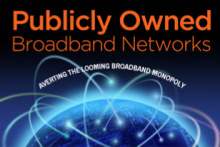The Fundamental Danger of Restricting Local Authority to Build Broadband Networks
Several days at the National Conference for Media Reform in Boston gave me time to reflect on the importance of protecting local authority to build, own, and operate their own networks connecting people and businesses to the Internet. Multiple presentations focused on the importance of and strategies for ensuring access to the Internet is not controlled by a few companies -- and most of these strategies are focused at federal government agencies and Congress.
While we support these efforts, the Institute for Local Self-Reliance is not a DC-centric organization. We try to help folks in DC learn about what is happening outside the beltway, but our passion and work focuses directly on helping local communities invest in themselves and preserve their self-determination.
Access to the Internet will likely be the key infrastructure investment that determines how well communities fare in the coming years. Unfortunately, they have very little control over how those investments are made when the networks are owned by private, absentee companies. Efforts like Universal Service Fund reform, fixing the FCC, re-writing the telecom act, and ensuring network neutrality depend on overcoming incredibly powerful (due to their scale and lobbying power) interests in Washington, DC. But local communities have very little power outside their borders... with some in state capitals and practically none in the nation's capital.



